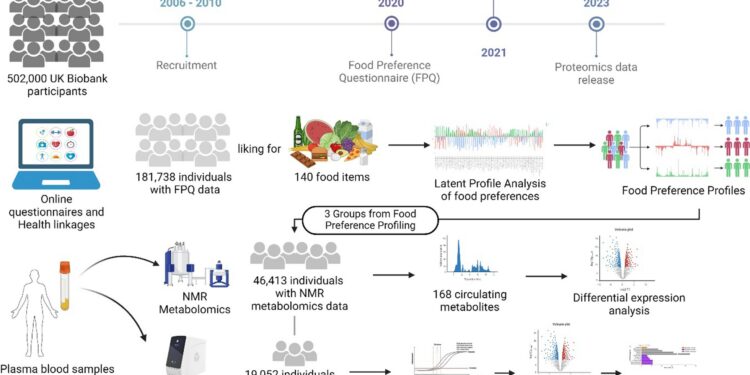Schematic methodological approach. Figure created with BioRender.com. Credit: Journal of Translational Medicine (2024). DOI: 10.1186/s12967-024-05663-0
People with a preference for sweets are at higher risk of developing depression, diabetes and stroke, according to a new study from the University of Surrey.
The study, published in the Journal of Translational Medicinetook anonymized information on the food preferences of 180,000 volunteers from the UK Biobank and used artificial intelligence to group them into three general profiles:
- Health conscious: prefer fruits and vegetables to foods of animal origin and sugary foods.
- Omnivore: Likes most foods, including meats, fish, and some vegetables, as well as sweets and desserts.
- Sweet tooth: Prefers sugary foods and drinks and is less interested in healthier options like fruits and vegetables.
The Surrey team looked at UK Biobank data on blood samples in which 2,923 proteins and 168 metabolites had been measured to see how these levels changed in each group.
Protein is the body’s workhorse, doing everything from fighting infections to muscle contractions and thinking. Metabolites are small molecules produced during digestion and other chemical processes in the body, and they can tell us a lot about how our bodies work.
By comparing these blood proteins and metabolites, researchers were able to get a clearer picture of the biological differences between the groups.
Professor Nophar Geifman, lead author of the study and professor of health and biomedical informatics at the University of Surrey, said: “The foods you like or dislike appear to be directly linked to your health. If your favorite foods are cakes, candy, and sugary drinks, our study results suggest that this could have negative effects on your health.
“We found that the foodie group was 31% more likely to have depression. We also found that the foodie group had higher rates of diabetes, as well as vascular heart problems, compared to the other two groups.
“Importantly, using data-driven artificial intelligence methods, we were able to identify groups of people defined by their dietary preferences, and these groups are meaningful to the extent that they are linked to outcomes health as well as biological markers.
“Processed sugar is a key factor in many people’s diets, and these results prove once again that as a society we should do everything we can to think before we eat, emphasizing that no one wants to to people what to do, our job is just to inform people.
The researchers also looked at differences between the three groups in standard blood biochemistry tests.
Professor Geifman explains: “In the sweet tooth group, they had higher levels of C-reactive protein, which is a marker of inflammation. Their blood results also show higher glucose levels and a poor lipid profile, which is an important warning sign of diabetes and heart disease.”
Conversely, the health-conscious group, which also consumed more dietary fiber, had lower risks of heart failure, chronic kidney disease, and stroke, while the omnivore group had moderate risks. for health.
According to the British Nutrition Foundation, on average in the UK, between 9% and 12.5% of an individual’s calories come from free sugar, defined as sugar added to food or drink. Cookies, rolls, cakes, pastries and fruit pies are the main contributors to sugar consumption among adults, but together, sugary soft drinks and alcoholic drinks contribute the most to free sugar consumption .
More information:
Hana F. Navratilova et al, Artificial intelligence-based definition of food preference endotypes in UK Biobank volunteers is associated with distinctive health outcomes and blood-based metabolomic and proteomic profiles, Journal of Translational Medicine (2024). DOI: 10.1186/s12967-024-05663-0
Provided by the University of Surrey
Quote: Having a sweet tooth is linked to a higher risk of depression, diabetes and stroke, study finds (October 9, 2024) retrieved October 9, 2024 from
This document is subject to copyright. Except for fair use for private study or research purposes, no part may be reproduced without written permission. The content is provided for informational purposes only.



